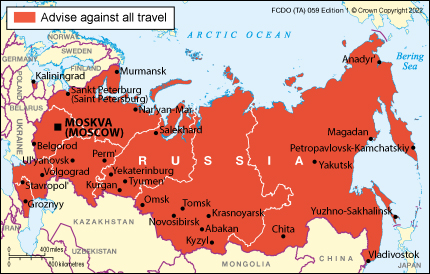Russia
Summary

The Foreign, Commonwealth & Development Office (FCDO) advises against all travel to the whole of Russia due to the lack of available flight options to return to the UK, and the increased volatility in the Russian economy.
If your presence in Russia is not essential, we strongly advise that you consider leaving by remaining commercial routes.
On 24 February 2022 Russia launched a large scale invasion of Ukraine which is ongoing.
On 4 March 2022, the Russian parliament passed laws imposing severe restrictions on the publishing and distribution of information related to the Russian armed forces and any military operations. See IT and Social Media page.
On 1 April 2022, there were reports of an incident at a fuel depot in the Belgorod region of Russia. The local authorities report that the incident is under control, but the wider situation remains unpredictable and could further escalate without warning.
If you are in Russia, you should be aware that it may not be possible to fly directly to the UK, or via EU countries, and should amend any travel plans accordingly. Check the latest information with your airline or travel provider. Connecting flights, largely via the Middle East and Turkey are operational for travel from Russia to the UK and other destinations.
British nationals in need of consular assistance should call the British Embassy in Moscow and then select the option for consular assistance +7 (8) 495 956 7200. Phone lines are answered 24hrs a day. You can contact the emergency services by calling 112.
See our returning to the UK page for information on exiting Russia and onward travel to the UK, including information about leaving via the Baltic States using bus services to leave Russia.
The value of the Ruble has fallen considerably in recent days, and there are reports of large numbers of people attempting to withdraw their savings from Russian banks. You should be aware that any amounts of Russian currency you hold may reduce in value over the coming days.
MasterCardMastercard and Visa have announced they are suspending operations in Russia. This means that MasterCardMastercard and Visa cards issued outside of Russia will not work at Russian merchants or ATMs. Cards issued inside Russia may continue to work in Russia but they will not work outside of Russia. You should be aware that it may not be possible for you to access your funds through Russian banks or to make payments to Russian businesses with non-Russian credit/debit cards.
Following President Putin’s decision to invade Ukraine, there have been several reports of anti-war protests across Russia. There is a heavy police presence to prevent these from taking place.
On 24 February the Russian authorities announced restrictions on domestic flights to a number of airports in southern Russia, with disruption to internal flights to and from Moscow and other cities. Currently Anapa, Belgorod, Bryansk, Voronezh, Gelendzhik, Krasnodar, Kursk, Lipetsk, Rostov-on-don, Simferopol and Elista are affected. Check the latest information with your airline or travel provider. The Russian aviation authorities have published information about the affected airports(in Russian). See Safety and security and Travel in Russia
There are reports of increased police presence and ID checks. You should keep your passport with you at all times. See Safety and security
If you decide to remain in Russia, keep your departure plans under constant review and ensure your travel documents are up to date. You should monitor the media and this travel advice regularly and subscribe to email alerts.
Consular support is severely limited in parts of Russia due to the security situation. The North Caucasus remains an unstable and potentially dangerous region. The Russian authorities take a particularly strict attitude towards security, as well as compliance with visa and registration rules.
Short-term travel restrictions are sometimes applied in relation to ongoing security operations. These are publicised at very short notice, if at all. Cross-border traffic with Georgia and Azerbaijan is also subject to restrictions. See Local travel
Find out what you need to know about coronavirus in Russia in the Coronavirus section.
During the COVID-19 pandemic, it is more important than ever to get travel insurance and check it provides sufficient cover. See the FCDO’s guidance on foreign travel insurance.
For information about COVID-19 vaccines, see the Coronavirus page.
Terrorists are very likely to try to carry out attacks in Russia. See Terrorism.
The UK doesn’t recognise Crimea as being part of Russia. See the Ukraine travel advice page for details.
Political rallies and demonstrations can occur in Moscow, St Petersburg and other places across Russia. Check the local media for the latest information, be vigilant, and avoid any demonstrations. See Political situation.
You should be aware of the risk of street crime. See Crime.
According to the Federal Agency for Statistics, British nationals made around 22,471 visit to Russia in 2020. Most visits have been trouble-free.
Small earth tremors are recorded throughout the year without consequences. To learn more about what to do before, during and after an earthquake, see the website of the US Federal Emergency Management Agency.
The Overseas Business Risk service offers information and advice for British companies operating overseas on how to manage political, economic, and business security-related risks.